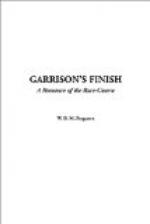On arriving at the Thirty-fourth Street ferry Garrison idly boarded a Forty-second Street car, drifting aimlessly with the main body of Long Island passengers going westward to disintegrate, scatter like the fragments of a bursting bomb, at Broadway. A vague sense of proprietorship, the kiss of home, momentarily smoothed out the wrinkles in his soul as the lights of the Great White Way beamed down a welcome upon him. Then it was slowly borne in on him that, though with the crowd, he was not of it. His mother, the great cosmopolitan city, had repudiated him. For Broadway is a place for presents or futures; she has no welcome for pasts. With her, charity begins at home—and stays there.
Garrison drifted hither and thither with every cross eddy of humanity, and finally dropped into the steady pulsating, ever-moving tide on the west curb going south—the ever restless tide that never seems to reach the open sea. As he passed one well-known cafe after another his mind carried him back over the waste stretch of “It might have been” to the time when he was their central figure. On every block he met acquaintances who had even toasted him—with his own wine; toasted him as the kingpin. Now they either nodded absently or became suddenly vitally interested in a show-window or the new moon.
All sorts and conditions of men comprised that list of former friends, and not one now stepped out and wrung his hand; wrung it as they had only the other day, when they thought he would retrieve his fortunes by pulling off the Carter Handicap. They did not wring it now, for there was nothing to wring out of it. Now he was not only hopelessly down in the muck of poverty, but hopelessly dishonored. And gentlemanly appearing blackguards, who had left all honesty in the cradle, now wouldn’t for the world be seen talking on Broadway to little Billy Garrison, the horribly crooked jockey.
It wouldn’t do at all. First, because their own position was so precarious that a breath would send it tottering. Secondly, because Billy might happen to inconveniently remember all the sums of money he had “loaned” them time and again. Actual necessity might tend to waken his memory. For they had modernized the proverb into: “A friend in need is a friend to steer clear of.”
A lesson in mankind and the making had been coming to Garrison, and in that short walk down Broadway he appreciated it to the uttermost.
“Think I had the mange or the plague,” he mused grimly, as a plethoric ex-alderman passed and absent-mindedly forgot to return his bow—an alderman who had been tipped by Garrison in his palmy days to a small fortune. “What if I had thrown the race?” he ran on bitterly. “Many a jockey has, and has lived to tell it. No, there’s more behind it all than that. I’ve passed sports who wouldn’t turn me down for that. But I suppose Bender” (the plethoric alderman) “staked a pot on Sis, she being the favorite and I up. And when he loses he forgets the times I tipped him to win. Poor old Sis!” he added softly, as the fact of her poisoning swept over him. “The only thing that cared for me—gone! I’m down on my luck—hard. And it’s not over yet. I feel it in the air. There’s another fall coming to me.”




